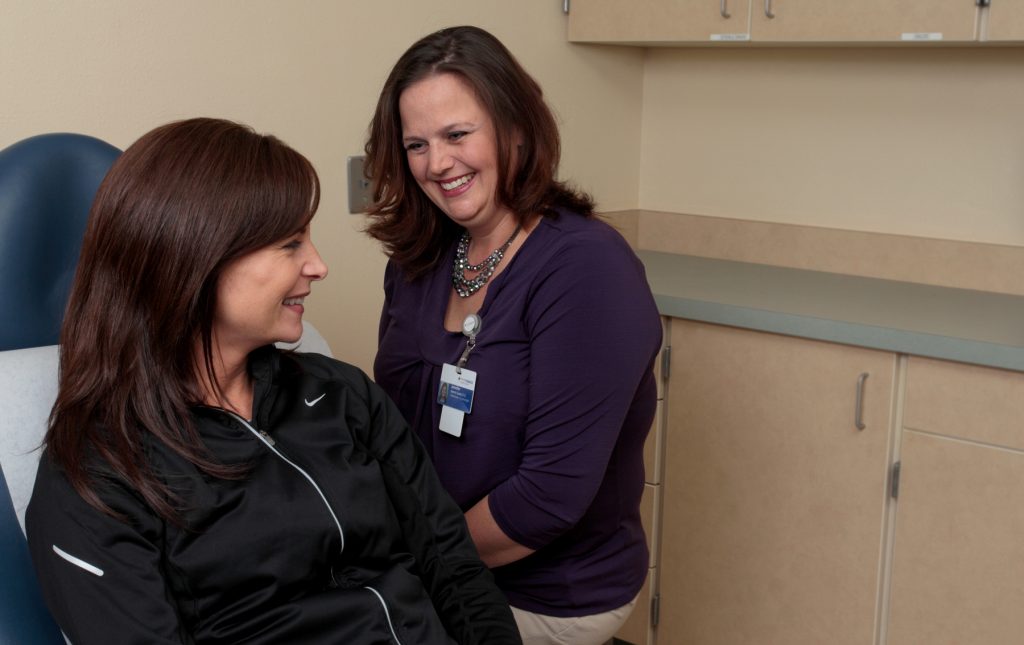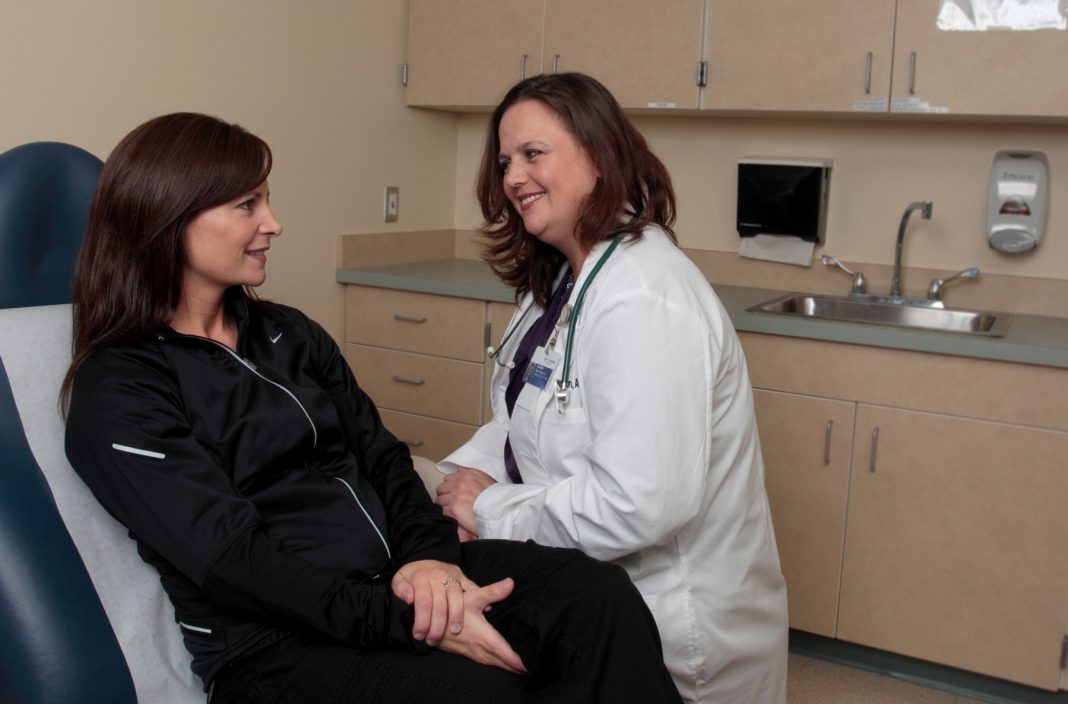Submitted by Providence Swedish
We asked two of the top OB/GYNs in South Puget Sound to answer some common questions about pregnancy and being a first-time mom. Here’s what Dr. Laurie Sorenson and Dr. Jennifer Marnik-Scalici had to say.
Laurie Sorenson, MD, has four daughters. Jennifer Marnik-Scalici, DO, is the mother of three children, so the answer to the first question we asked (What’s the first call I should make when I find out I’m pregnant?) was easy for them – call your mom!

Combined, they have more than 50 years of experience and have delivered thousands of babies in Lewis and Thurston counties:
- Dr. Sorenson was a founding partner of Olympia Obstetrics & Gynecology in 2001. The practice recently became Providence Swedish Obstetrics and Gynecology Olympia. She has provided care in the community for more than 30 years. She serves as medical director of Women’s and Children’s Services at St. Peter Hospital.
- Dr. Scalici joined the Providence Centralia Women’s Center in 2007 and has been a dedicated part of the community ever since. She delivers about 120 babies each year. Her patients enjoy her communication style and she was voted “best physician” in Lewis County in 2022 by readers of The Chronicle.

Here are their answers to common questions from expecting moms:
What’s the first call I should make when I find out I’m pregnant (after calling your mother)?
Every choice you make should be what’s best for you and your baby. Your first choices are where you will deliver your baby and who your doctor will be.
“The great thing about this area is that we have great providers,” said Sorenson.
Ask family and friends for recommendations and search online. You can review doctors at the Providence website and tour the Providence St. Peter and Providence Centralia hospital family birth centers via video:
- Providence St. Peter Hospital Family Birth Center – Video
- Providence Centralia Hospital Family Birth Center – Video
“Once you have a preference for a doctor, call the office and schedule a new OB intake with a nurse,” said Scalici.
While I’m waiting for my first appointment, what should I do about medications, prescriptions, vaccinations, food, etc.?
Gather your medication list and have it ready for your first appointment. “If you have medications you take routinely, you will want to double-check if they are safe during pregnancy,” said Sorenson. “Ideally you can check this with your provider before you get pregnant, but it is not too late even after you get a positive test.”
In the meantime, stop using tobacco, alcohol, or drugs to give your baby the best environment to thrive. “Eat a well-balanced diet minimizing processed food; no raw or unpasteurized dairy products and deli meats, and avoid seafood that contains high mercury levels,” said Scalici. “Vaccinations recommended for pregnancy are seasonal flu shot, TDAP booster, COVID-19 booster and may include RSV in the near future.”
If you need something for a cold or headache, our physicians recommend over-the-counter medicines, acetaminophen (Tylenol) rather than Ibuprofen (Advil).
How many appointments will I have prior to delivery?
Most women visit their doctor monthly during the first 28 weeks, every two weeks until 36 weeks and then weekly until delivery.
“You will have the option to do some genetic testing, and sometimes this includes finding out the gender of your baby,” said Sorenson. “These tests are always available but sometimes not covered by insurance, so that will be discussed with your provider at the first appointment typically.”
What’s a birth plan?
“We want to know what is important to you so we can focus on you, your wishes and preferences,” said Scalici. “This will increase communication between doctors, nurses, midwives and patients through the entire labor, delivery and postpartum process.”
Providence Swedish hospitals are currently implementing TeamBirth at the bedside, which serves to elevate patient dignity; mitigate implicit bias; and improve unit cultures with the goal of decreasing Cesarean delivery and maternal morbidity and mortality while enhancing team communication throughout the entire birthing process.
“We will want to know who you want with you when you deliver and whether you want to use any pain relief options,” said Sorenson. “Letting your team know what will help you feel successful and in control of your labor is really helpful.”
How much weight should I plan to gain during pregnancy?
How much you weigh before you get pregnant is one of the biggest determinants of how much weight you should gain during pregnancy.
“For most people, total weight gain in the first three months should be about 5 pounds, although don’t worry if it is a little more or less than that, as sometimes nausea prevents eating much at first,” said Sorenson. “Your provider will give you a range of weight gain as a goal, usually about 25 pounds.”

What pregnancy symptoms are normal? And what’s an emergency?
Nausea, swelling of the feet and fatigue are all normal symptoms, according to both doctors. Any bleeding or excessive pain (especially later in pregnancy) is something to see prompt medical attention for.
“Decreased fetal movement, vision changes, epigastric pain (pain or discomfort right below your ribs in the area of your upper abdomen), or preterm contractions should also result in a trip to the hospital,” said Scalici.
What should I expect during labor/delivery and who will deliver my baby?
“You should expect to be kept informed of your current labor progress, what is coming next, and your options for pain management or further treatments,” said Scalici. “This is part of the TeamBirth process.”
“When it comes time to deliver, you will be given instructions about where to go. The team of nurses and the providers who have been caring for you during your pregnancy will be there to help with your labor and birth,” added Sorenson. “There is always someone that is available and on call to be there for you.”
What’s the likelihood I’ll need a C-section?
About one in five pregnancies result in a C-section.
“Some of the factors that cause a C-section not encountered until during the labor process include malposition breech (bottom or feet presenting); asynclitic (crooked) position or occiput posterior position (sunny side up) of fetal head; cephalopelvic disproportion (baby too big to fit through mom’s pelvis); fetal intolerance to labor (abnormal heart rate during labor); abnormal bleeding; or placenta abnormalities,” said Scalici. “Some of the other conditions that may increase the likelihood of a C-section include advanced maternal age, obesity, chronic hypertension and diabetes.”
“Keeping yourself healthy and avoiding smoking and drugs is a great way to avoid needing a C-section for those preventable causes,” said Sorenson.
Find out more by visiting:
- Providence St. Peter Hospital Family Birth Center website
- Providence Centralia Hospital Family Birth Center website
- Olympia Obstetrics & Gynecology 360-413-8413
- Providence Centralia Women’s Center 360-330-8950
- Maternity Care Close to Home
Sponsored


















































